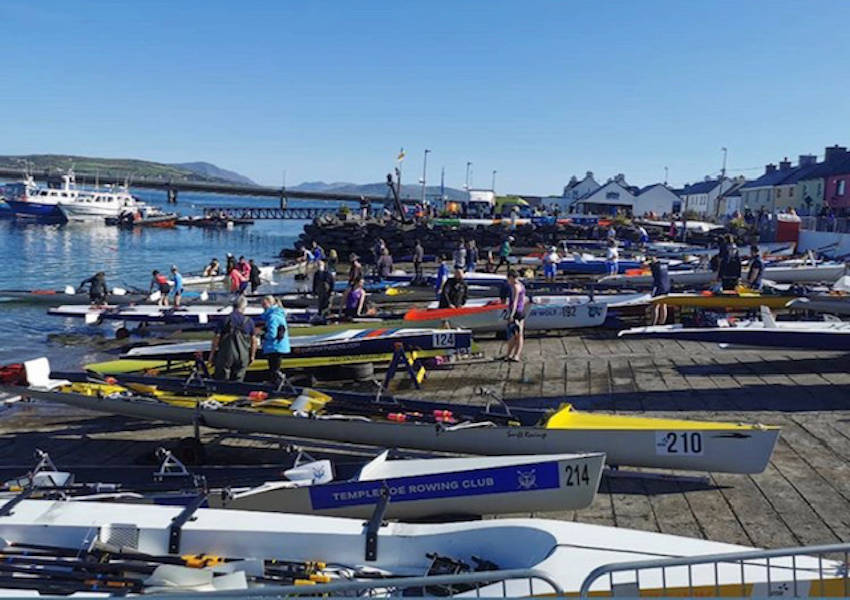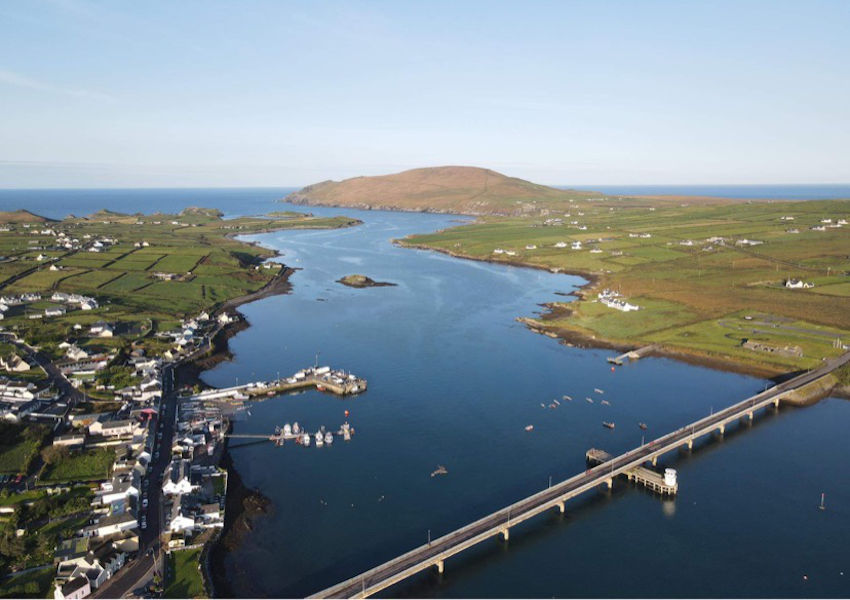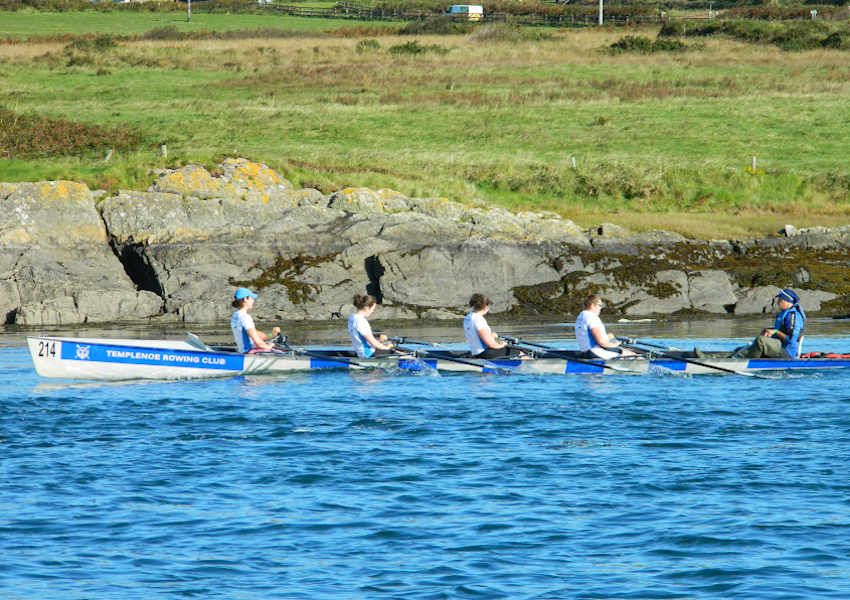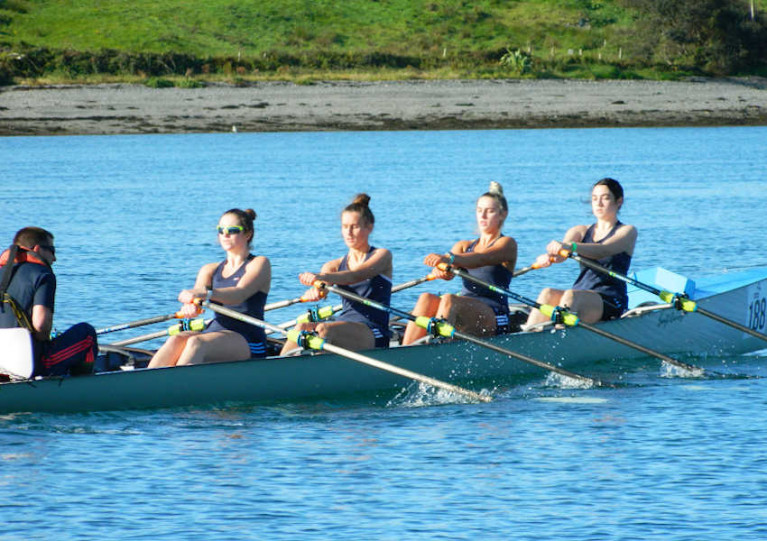Displaying items by tag: Irish Offshore Rowing Championships
Intense Battles In Portmagee At 2020 Irish Offshore Rowing Championships
Coastal rowing is one of the fastest growing sports in the world, with Ireland at the forefront — and this showed in the competitive atmosphere at the Irish Offshore Rowing Championships, writes David Hussey.
Portmagee Rowing Club El Nino in South Kerry hosted the event on Saturday 26 and Sunday 27 September. Usually a single-day affair, the senior A-grade races were spread out over the weekend to abide by current public health guidelines.
Heats were needed in most events, with the highlight on Saturday being the women’s quad final — featuring a packed field of 12 boats on the starting line.
 Boats lined up on the Portmagee slip at the 2020 Irish Offshore Rowing Championships
Boats lined up on the Portmagee slip at the 2020 Irish Offshore Rowing Championships
As previously reported on Afloat.ie, reigning champions Killorglin — featuring Olympic rower Monika Dukarska — made it three in a row in this event, and then two of the crew went on to win the doubles contest.
The mixed doubles also was an intense battle with a novel pairing of Kealan Mannix and his sister Alyssa taking the gold for Rosscarbery.
On Sunday, the standout performances came from the Myross/Castletownshend composite in the quad. Stung by last year's defeat due to a poor start, the Cork crew spent 12 months waiting to avenge their loss. They exploded off the start line and established an early lead which they held all the ways around the course.
The men’s single featured an intense battle between John Harrington from the Galley Flash club and Kealan Mannix of Rosscarbery. Kealan did just enough in the last part of the race to forge ahead and claim a second gold.

Monika Dukarska dominated the women’s solo with an explosive start, and Donegal Bay came from behind to record a famous victory in the men’s doubles.
Running any sports event in these times can be very challenging due to the coronavirus guidelines. The athletes have to compete in an isolated environment to keep them safe, and while 100 spectators are allowed at this present time, the club felt it best to ask that no patrons attend this event.
Portmagee Rowing Club El Nino wish to thank all the voluntary help that they received from the community in Portmagee; the fishermen who allowed the club to move their boats and fishing gear to give full use of the slip all weekend; the safety boat crews and boats; the help and support from other traditional rowing clubs in South Kerry; and also all stewards and helpers who freely gave their time.
 Templenoe Rowing Club’s 214 boat with Gerard van Deventer coxing, Isobel van Deventer, Corina van Deventer, Heather O’Donoghue and Helen Harvey
Templenoe Rowing Club’s 214 boat with Gerard van Deventer coxing, Isobel van Deventer, Corina van Deventer, Heather O’Donoghue and Helen Harvey
The club would like to thank the members of An Garda Siochana for all their help up to and during the weekend; Kerry County Council for cleaning down the slip; and all the local businesses who supported this regatta.
It is onwards and upwards for our sport and we know that like all sports, we will have to continue to restrict our numbers of competitors and spectators at our events until this pandemic has passed.
To all fellow clubs, Portmagee Rowing Club El Nino gives thanks for attending and making this a superb weekend — and all look forward to next year and competing in the championships in Bantry, Co Cork.
Silver For Irish Men’s Quad In Rowing’s Junior Euros In Belgrade
Ireland’s men’s quad crew took silver at the 2020 European Rowing Junior Championships in Belgrade this weekend.
Andrew Sheehan, Adam Murphy, Tom Kelly and Brian Colsh finished second in their A Final before claiming silver medals in their final this afternoon (Sunday 27 September).
Ireland’s women’s quad crew were also high achievers, with Holly Davis, Aoife Moloney, Alison Bergin and Molly Curry placing fifth in a very competitive A Final.
Rowing Ireland’s high-performance director Antonio Maurogiovanni said: “I want to congratulate both crews, their coaches John Armstrong and Ciro Prisco and the junior coordinator Fran Keane for the excellent performances at the European Junior Championships.
He added: “Both crews trained very well at the National Rowing Centre, proving that the hard and good work pays off. For this young group of athletes, this European Championship needs to be taken as the first step of a long journey.
“Thank you to all the athletes, coaches, and support staff for hard working in achieving these performances. I would also like to thank the athletes’ parents and club coaches for their continued enthusiasm and support.
“We look forward to continuing the success of the European Junior and U23 championships with the Senior European Championships on 9 October.”
@AfloatMagazine Two-time world champion and Irish Olympic team member Monika Dukarska and World Junior finalist, Rhiannon O'Donoghue after their victory with the Killorglin team, in the women's quad final of the Irish Offshore Rowing Championships race today. Portmagee, Co. Kerry pic.twitter.com/apKAaAIpOH
— Stephen Power (@stepowerphotos) September 26, 2020
Elsewhere, the Irish Offshore Rowing Championships took place yesterday (Saturday 26 September) in Portmagee, Co Kerry, following a change in venue from Portnoo Beach due to coronavirus restrictions.
The team from Killorglin — featuring two-time world champion and Olympic team member Monika Dukarska and world junior finalist Rhiannon O’Donohue — were the big winners in the women’s quad final.
Killorglin also took the women’s doubles, and Dukarska the women’s solo final, with Kealan Mannix of Rosscarbery winning the men’s solo event.
Donegal Bay were triumphant in the men’s doubles, with Mycross/Castletownshend winning the men’s quad, and Rosscarbery coming first in the mixed doubles final. Full results are available HERE.































































